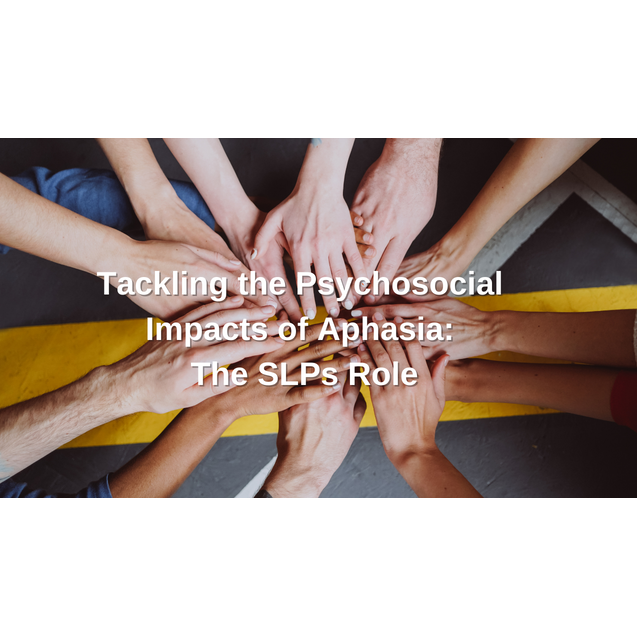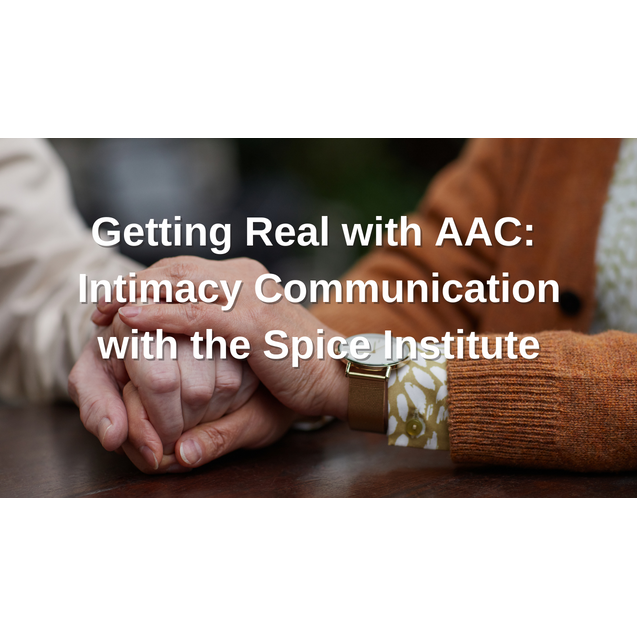Catalog

This course has been developed for delivery to speech-language pathologists. It is registered for 1 PDH / 0.1 ASHA CEUs.
All participants must use the latest version of Chrome as a browser on their computer at every juncture of the course in order for the course to be completed.
Course Description
This course identified psychosocial impacts of aphasia and associated impacts on quality of life and rehabilitation outcomes. We demonstrated ways SLPs can address these issues within a treatment plan encompassing the LPAA approach. We also discussed the benefits of social groups for people with aphasia and the SLPs role in providing resources regarding opportunities for social participation.
Introductory level; Professional
Disclaimer:This course uses examples from Lingraphica products and services. There will be limited information about other products or services.
ASHA CE Provider approval and use of the Brand Block does not imply endorsement of course content, specific products, or clinical procedures. LingraphiCare America is approved by the Continuing Education Board of the American Speech-Language-Hearing Association (ASHA) to provide continuing education activities in speech-language pathology and audiology.
Requirements for Satisfactory Course Completion:
Completion requires learners to (1) view/attend the instructional presentation in full; (2) receive a minimum of 80% on the learning assessment; and (3) submit a course evaluation. Learners may retake the learning assessment as needed until the satisfactory score is achieved. Questions, assistance requests, and feedback may be sent to trafferty@lingraphica.com
About this item
This course is valid from November 1, 2025 to November 30, 2025.
This course has been developed for delivery to speech-language pathologists. It is registered for 1 PDH / 0.1 ASHA CEUs.
All participants must use the latest version of Chrome as a browser on their computer at every juncture of the course in order for the course to be completed.
Course Description
This course identified psychosocial impacts of aphasia and associated impacts on quality of life and rehabilitation outcomes. We demonstrated ways SLPs can address these issues within a treatment plan encompassing the LPAA approach. We also discussed the benefits of social groups for people with aphasia and the SLPs role in providing resources regarding opportunities for social participation.
Introductory level; Professional
Disclaimer:This course uses examples from Lingraphica products and services. There will be limited information about other products or services.
ASHA CE Provider approval and use of the Brand Block does not imply endorsement of course content, specific products, or clinical procedures. LingraphiCare America is approved by the Continuing Education Board of the American Speech-Language-Hearing Association (ASHA) to provide continuing education activities in speech-language pathology and audiology.
Requirements for Satisfactory Course Completion:
Completion requires learners to (1) view/attend the instructional presentation in full; (2) receive a minimum of 80% on the learning assessment; and (3) submit a course evaluation. Learners may retake the learning assessment as needed until the satisfactory score is achieved. Questions, assistance requests, and feedback may be sent to trafferty@lingraphica.com
Course/Activity Information
- Identify two ways depression and anxiety impact rehabilitative outcomes and quality of life
- Identify two barriers to accessing social networks for People with Aphasia
- Define the SLP’s role in counseling
- Describe how the Life Participation Approach can be used to enhance social participation
- Describe three social supports available to increase social interaction for People with Aphasia
Time-Ordered Agenda
- 5 minutes: Introduction
- 5 minutes: Patient profile
- 15 minutes: Psychosocial Impacts of Living with Aphasia
- 15 minutes: Addressing Depression and Social Isolation
- 15 minutes: Opportunities for Social Participation
- 5 minutes: Conclusion/Questions and Answers
Instructional Personnel
Teresa Thompson, MA, CCC-SLP
Teresa joined Lingraphica in 2020. She has worked as a speech-language pathologist with adults in the acute care, outpatient, skilled nursing, and home health settings. Teresa earned her BSBA from the University of Denver and her Master of Arts in Speech-Language Pathology from Northwestern. University.
Relevant Financial Relationships: Teresa Thompson is an employee at Lingraphicare America, Inc. Relevant Non-Financial Relationships: No relevant non-financial relationships exist.
Allie Reed, M.S. CCC-SLP
Allie joined Lingraphica in 2021. She is an adult specialized speech language pathologist and has experience working in acute care, inpatient rehab, and outpatient. Allie has a passion for aphasia and has worked with this population over the past decade. Allie earned her Bachelor of Science in Speech Pathology & Audiology from the University of Nevada, Reno and her Master of Science from Northwestern University.
Relevant Financial Relationships: Allie Reed is an employee at Lingraphicare America Inc., as well as an independent contractor with the Aphasia Recovery Connection.
Relevant Non-Financial Relationships: No relevant non-financial relationships exist.
We are here to help. Please contact us for learning accommodations or your accessibility needs:
continuinged@lingraphica.com
Other information
-
Contact:Patricia Rafferty
- Training Hours: 1.00


.png)
.png)

